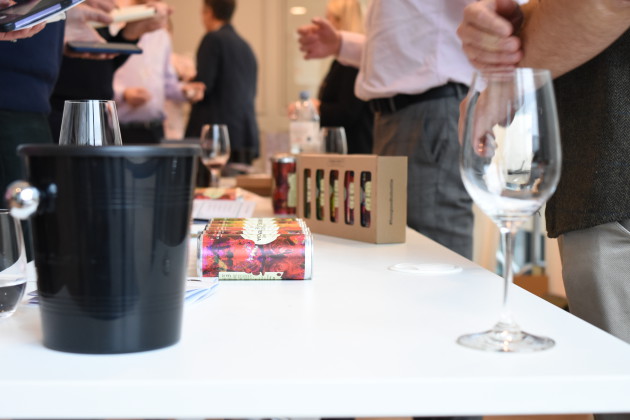
Long read: Alternative formats group refuses to let wine fall behind
As the COP26 Glasgow conference draws to a close, the UK wine trade moves a step closer to a more sustainable approach to wine packaging, with The Copper Crew, When in Rome, Graft Wine, BIB Wine, Canned Wine Co, and More Wine joining forces to form the Wine Traders for Alternative Formats association (WTAF).
The alliance held its first trade tasting in London yesterday, where it showcased its commitment to reduce wine’s carbon footprints by championing non-glass, lightweight formats such as aluminium cans, bag-in-boxes, paper bottles and keykegs.
Indeed, according to a 2015 paper published in the Internet Journal of Viticulture and Enology, glass bottles are responsible for the majority of a wine’s carbon footprint, followed at a short distance by cardboard boxes, electricity, and fuel.
A recent report commissioned by Finnish alcohol monopoly, Alko, confirmed the findings, claiming that glass bottles account for almost half of a wine’s total environmental impact (46%). The report also shows that alternative packaging such as 33cl aluminium cans and 1.5 litre pouches can reduce a wine’s CO2-per-litre emissions by 3.5 and 7 times respectively, when compared to a standard 75cl glass bottle (540g).
“We are all very small companies, so it’s very hard to move the dial by ourselves,” says Rob Malin, co-founder and CEO of When in Rome, which offers Italian wines in cans, bag-in-boxes, flat and Frugalpac bottles. Convincing the public that good quality does not clash with alternative packaging is a “slow and expensive process”, says Malin, yet he notes that drinkers are increasingly looking at bag-in-box and can for both their practicality and green credentials, while also appreciating that they can carry a premium product. “When we started selling in Waitrose five years ago, all other bag-in-box wines were priced at £15, ours was £25. Now there are a few other products with a similar price-tag.”
It’s not just consumers that need convincing, though. Malin points out that producers can be hesitant, too: “The best dialogue we had was in Abruzzo, while in Piedmont producers tend to be more conservative.”
BIB buyer Fleur Pushack reassures that it’s becoming increasingly easier to get producers on board. “Three years ago, when we started, it was more difficult, but now it’s becoming less and less of a hurdle. For many producers, this is a great opportunity. We ship 1,000 litres at a time and ensure they’re also happy with the packaging.”
↓
Greenwashing challenge
While glass bottles can be responsible for much of a wine’s carbon emissions however, focusing the attention on the packaging alone might risk trivialising sustainability’s complex and multifaceted nature. Some bag-in-box components such as plastic taps for instance, aren’t currently kerbside recyclable and end up in landfills unless upcycled.
To tackle the challenge, BIB offers a free recyclable service for its bag-in-boxes’ plastic parts. “We send a freepost envelope that can take up to 10 bags and taps,” says Pushack. “This is then sent to a company called Enval, which breaks everything down and reuses it to make other packing. It’s effectively a closed loop.” Bag-in-box specialist, More Wine, adopts a similar approach by using US-based recycling business, TerraCycle.
Although not always provable, most WTAF members also claim they look for sustainable production when seeking new suppliers. “We only work with small, independent producers, many of which have been owned by the same family for generations and are therefore environmental stewards by definition,” says Malin.
Meanwhile, Canned Wine Co buyer, Ben Franks, highlights that partnering with organic suppliers can be tricky, as high levels of copper – the principal fungicide used in organic viticulture – can react with their cans. “If there’s too much copper we just can’t can it, so for now only our Grüner and St Laurent (which contain little copper) are certified organic. We do however have a head of sustainability who checks all aspects of sustainability throughout our supply chain,” he says.
WTAF and Copper Crew co-founder Oli Purnell argues that rethinking the packaging format is the easiest way to reduce a wine’s carbon footprint, yet advocates for a more holistic approach to ethical practices.
“In the wine trade there is a lot of talk about sustainability. That extends to maybe how the grapes are grown and the agricultural methods used, but not too much else. For instance all of our wines are certified by the Sustainable Wine South Africa Alliance. Our labels aren’t fully recyclable yet, but we’re looking to replace them at the next canning round next year. Of course it could be better, but you have to treat sustainability as an ongoing process,” he says.
Keywords:
- wine
- UK
- trade
- alternative
- bottles
- formats
- paper
- glass
- alternative formats
- wine’s
- bib
- carbon
- boxes
- wine’s carbon
- 2015 paper
- paper bottles
- boxes paper
- wine’s carbon footprints
- non glass lightweight
- glass lightweight formats
- 2015 paper published
- boxes paper bottles
- WTAF





